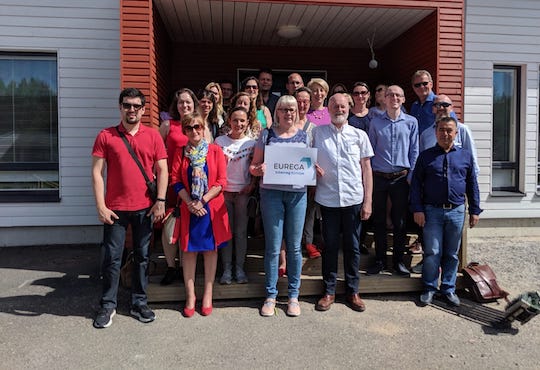Gastronomy plays a vital role in supporting community well-being and health, and many initiatives are emerging in European regions that capitalise on local food as a means to ensure and promote healthier lifestyles. However, the need is increasingly felt for new policy frameworks that highlight the importance of local gastronomy as a powerful resource to enhance healthy living.
Hosted by ProAgria Pohjois-Savo, the 3rd Interregional Knowledge Exchange visit of the EUREGA Interreg Europe project aimed at collecting and disseminating good practises from the involved partners in the area of Gastronomy and Health to ultimately influence related local, regional and national policies and boost local sustainable development models.
Stakeholders from eight European regions, including six awarded European Regions of Gastronomy, gathered in Kuopio (Finland) on 18-20 June 2019 to present their most outstanding initiatives and to learn about Kuopio region’s actions in the sector.
The Nordic Diet, based on wholegrain products, wild berries and freshwater fish, and the Finnish free school lunch, identified as Kuopio’s strengths, were among the topics presented to the partners. Furthermore, the hosts illustrated interesting local case studies, including the research on well-being as a new food trend conducted by the Future Food Unit of Savonia University of Applied Sciences and the ongoing investigation and cultivation of the Arctic Bramble (University of Eastern Finland).
Many of the good practices discussed during the meeting have been developed by regions as part of their European Region of Gastronomy title programme, such as the Local Breakfast project in Sibiu, aimed at introducing local healthy products in the breakfast menu of local restaurants and accommodation facilities, and the Healthy Village in North Brabant that has managed to influence citizens eating habits to prevent nutrition-related diseases.
The EUREGA Interreg Europe project demonstrates how the European Region of Gastronomy Platform can foster knowledge-exchange among regions and the creation of international joint initiatives aimed to boost regional sustainable development and able to raise financial support from the European Union.
IGCAT is Advisory Partner in the project and provides research and methodology support to partners. The European Regions of Gastronomy involved are: Catalonia (2016), Galway-West of Ireland (2018), North Brabant (2018), Sibiu (2019), South Aegean (2019) and Kuopio (2020).
About the European Region of Gastronomy
Candidate and awarded Regions of Gastronomy from Europe, guided by IGCAT, are working together to raise awareness about the importance of their cultural and food uniqueness and share the long-term aim to: promote a better quality of life in European regions; highlight distinctive food cultures; educate for better health and sustainability; nurture creativity; improve tourism standards; and stimulate gastronomic innovation.
About IGCAT
IGCAT aims to empower local communities by raising awareness of the importance to safeguard and promote distinct food, culture, arts and sustainable tourism assets. This is essential to balance against globalised food trends that are impacting on our planet, health and local economies.
IGCAT is a non-profit institute established in 2012, working with regional stakeholder consortiums in the fields of gastronomy, culture, arts and tourism. It counts on the expertise of a worldwide network of experts and works in partnership with specialised intergovernmental organisations.
IGCAT provides the Region of Gastronomy Award and is the official secretariat for the European Region of Gastronomy Platform. Furthermore, the Institute has developed the European Young Chef Award the Local Food Gift Challenge, the Top Visitor Experience and the Food Film Menu.
21 junio 2019
